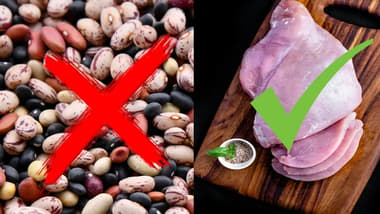A Practical Guide to Sustainable Weight Loss for Kenyans
The uncomfortable truth about why Kenyans' weight loss efforts fail and what actually works.
The uncomfortable truth about why Kenyans' weight loss efforts fail and what actually works.

Most of us like the idea of losing weight more than doing what's necessary to achieve this goal. And who can blame us? Dieting is hard. But for most Kenyans, it's not just about the difficulty but also the lack of information on how to do it properly. Ask someone how they’re dieting, and you’ll hear, “I skip lunch,” or “I’m on OMAD.” By next month they’re onto the next thing; slimming tea, coconut coffee cleanses, celery juice, you name it. Essentially, many follow what's trending on TikTok that month, eventually falling off due to difficulty compounded with the lack of results.
Often, successful and sustainable weight loss isn't about extreme measures. Instead, it's rooted in a clear understanding of the fundamental principles of energy balance.
A recent study reports that obesity in Kenya has risen to about 31% in recent years, mostly in urban areas. The authors attribute this increase to greater consumption of high‑calorie, obesogenic diets and note that most Kenyans vastly underestimate their actual calorie intake. Essentially, We tend to "eyeball" our portions, especially with staples like ugali, mandazi, rice, and chapati. For instance, a common Kenyan breakfast of three mandazis and tea with milk can contribute 600-700 calories, a significant portion of the daily recommendation for many individuals. Add sukuma wiki cooked in oil, some fatty meat, and a small piece of ugali and you're looking at a 800+ calorie meal without realizing it.
The same goes for snacks. Those handfuls of groundnuts you nibble all day to curb hunger, or that juice cocktail from mama mboga on your way home; what feels like tiny healthy treats can sneak in an extra 500–1000 calories before you know it.
The World Health Organization (WHO) shows that weight gain is primarily a result of energy imbalance, and weight loss is fundamentally about creating a calorie deficit– burning more calories than you consume. However, calorie awareness is a practice that many people in Kenya haven't yet incorporated into their health routine, representing a major opportunity for change.
Start by downloading a calorie tracking app like MyFitnessPal or Cronometer. For one week, weigh and track everything you eat and drink. Don't change your eating habits yet, just observe. You'll be shocked at how quickly calories add up.
A typical Kenyan breakfast of tea with milk and sugar and two pieces of samosa or bread with margarine can easily hit 500-600 calories. Add a mid-morning snack and you're already at 800+ calories before lunch.
While excellent for heart health, cardio is only one piece of the puzzle. To truly enhance your metabolism, incorporating resistance-based training is important. Research shows that resistance-based exercise programs help build muscle that burns calories 24/7. More muscle mass means a higher metabolic rate, making weight loss and maintenance easier.
You don't need an expensive gym membership. Bodyweight exercises like push-ups, squats, lunges, and planks can be done anywhere. Start with 3 sessions per week, 20-30 minutes each.
Track your intake religiously for at least 30 days. This builds awareness of portion sizes and calorie density.
Focus on protein at every meal. Aim for 1.6-2g per kg of body weight daily. Protein keeps you full and preserves muscle during weight loss.
Embrace meal prep. Sunday meal prep prevents impulsive food choices during busy weekdays.
Drink more water. Often what we interpret as hunger is actually thirst. Aim for 2-3 liters daily.
Get adequate sleep. Poor sleep disrupts hormones that control hunger and satiety.
The principles of weight loss are straightforward, and success begins with a clear awareness of current habits and a commitment to new ones. It's common to feel that our rich food culture or a perceived 'slow metabolism' is the primary barrier. However, by focusing on the principles you can control—like calorie awareness and strength training—you can effectively navigate these challenges.
For comprehensive nutrition guidance tailored to Kenya's food culture, check out our Complete Nutrition Guide for Kenyans Beginning Their Fitness Journey on a Budget.
The tools for successful weight loss are available to everyone, and you have the power to start using them today.
Continue reading with these related fitness and health articles




Join the conversation!
Share your thoughts on "A Practical Guide to Sustainable Weight Loss for Kenyans" below.